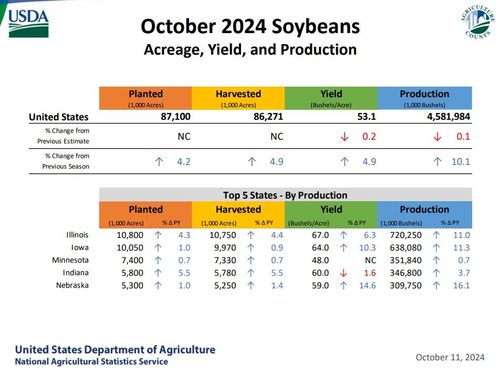USDA maintains prediction for record soybean yields, production

SOURCE: USDA
October 11, 2024
BY Erin Voegele
Advertisement
Advertisement
Related Stories
The USDA maintained its 2024-’25 and 2025-’26 forecasts for soybean oil use in biofuel production in its latest WASDE report, released Sept. 12. The estimate for 2023-’24 soybean oil use in biofuel production was revised up.
The USDA increased its forecast for 2025 soybean production in its latest Crop Production report, released Sept. 12. Soybean production for beans is forecast at 4.3 billion bushels, up slightly from the August forecast, but down 2% from last year.
The U.S. Department of Energy on Aug. 29 awarded funding to two SAF research projects, including a project that aims produce SAF from bio-derived methanol and a project that aims to use distillers grains with solubles (DGS) as a SAF feedstock.
More than 40 members of Congress on Sept. 9 sent a letter to U.S. EPA Administrator Lee Zeldin urging the agency to reduce proposed RFS RVOs for 2026 and 2027, block reallocation of SRE volumes, and scrap plans to boost domestic biofuel production.
The U.S. EIA on Aug. 29 released data showing total U.S. operable biofuels capacity expanded slightly in June, with small gains for both ethanol and renewable diesel. Feedstock consumption was up when compared to the previous month.





